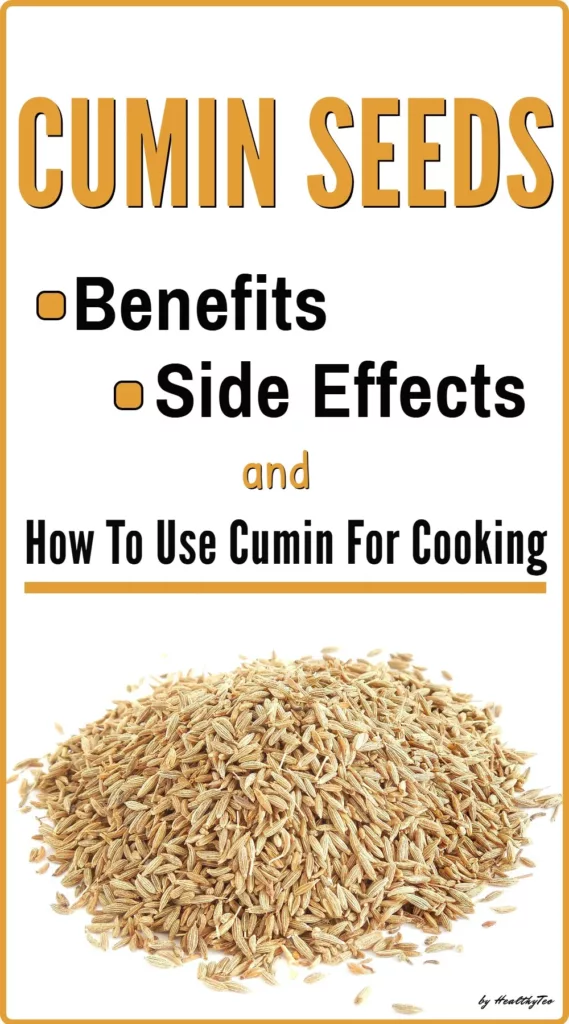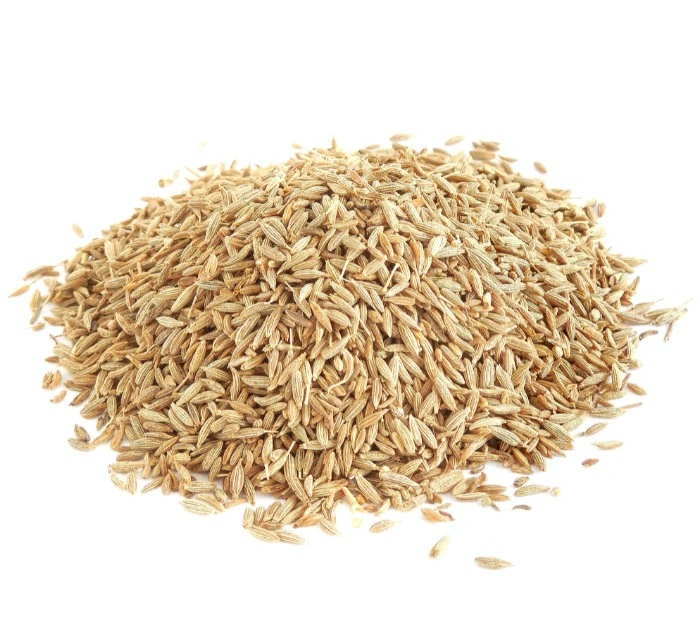Benefits, side effects and how to cook with cumin
Cumin seeds are used in the cuisines of many cultures in both – ground and whole form. You might recognize cumin as one of the main flavors of taco seasoning and chili powder. It is one of the top 10 spices sold in the U.S.
Here in this article, we will show you why cumin is good for you, the benefits, and the potential side effects of adding it to your recipes. Also, you can find out how to use cumin for cooking.
Before that let’s see some interesting facts about cumin:
- Cumin is the second most popular spice in the world after black pepper.
- Cumin was used in mumification processes in Ancient Egypt.
- Ancient Egyptants and Greeks documented its value as a medicinal plant, it has been used as makeup, money, and carried as a charm.
- Aproximatley 70% of the world’s cumin is produced in India.
- Many types of French bread contain cumin seeds.
This post may contain affiliate links, which means we may receive a small commission, at no cost to you, if you make a purchase through a link. For more information, please see our disclosure.
What is cumin?
Cumin is a leafy plant scientifically known as Cuminum cyminum. The fruit of the plant is called the cumin seed. Cumin seeds are used all over the world as a spice.
People usually buy cumin in the form of whole-dried seeds or as a ground powder. It is extensively used in culinary practices in India, and other Asian, African, and Latin American countries.
Tase of cumin – rich and hearty, earthy and warm, with an edge of citrus cumin adds instant depth to any dish. In recipes where you want the flavor to disperse evenly throughout use ground cumin rather than whole cumin seeds.
What’s more, cumin has long been used in traditional medicine. Modern studies have confirmed some of the health benefits of cumin that is traditionally known for.
While some benefits of cumin are hard to prove let’s see what are the evidence-based benefits of cumin.
Health benefits of cumin seeds
May help regulate digestion
Cumin seeds may be beneficial for relieving digestive problems. According to a study about the enzymatic activity of cumin published in Food Chemistry, cumin increases the activity of digestive enzymes and releases bile from the liver. Bile helps in digesting fats and certain nutrients in the body.
Cumin seeds and extract may be highly effective in improving symptoms of irritable bowel syndrome (IBS) such as nausea, cramps, gas, bloating, and digestive spasms. This was confirmed by a pilot study conducted to evaluate the efficacy of the cumin extract.
According to this pilot study published in the Middle East Journal of Digestive Diseases, cumin extract can be effective in improving all IBS symptoms.
As you can see in this study was used cumin extract which is much more concentrated. So more studies are needed to confirm the positive effects of cumin on improving IBS symptoms.
Cumin seeds are rich in iron
Cumin seeds are a good source of iron. Just one teaspoon of ground cumin contains 1.3 mg of iron which is 17.5% of the RDI for adult men and 7% for women aged 19-50 years.
This mineral is involved in various bodily functions, including the transport of oxygen in the blood. Iron deficiency affects up to 20% of the world’s population and up to 10 in 1,000 people in the wealthiest nations.
Iron-rich cumin can be a nutritious addition to the daily diet for those with anemia. Few foods are as iron-dense as cumin. Even when used in small amounts as a seasoning, cumin is a good iron source.
Rich in antioxidants
Cumin seeds contain plant compounds such as terpenes, flavonoids, phenols, and alkaloids. Several of these function as antioxidants.
Antioxidants are very important, they help reduce the damage done on the body by free radicals. They also help you feel healthier, more energetic and also help keep your skin from looking aged.
May help lower cholesterol
A study published in the International Journal of Health Science demonstrated that “bad” LDL cholesterol levels were decreased by nearly 10% in patients taking cumin extract over one and a half months.
Another study from 2016 suggests that 75 mg of cumin taken twice daily for eight weeks may help bring down bad cholesterol levels.
Furthermore, cumin powder mixed with yogurt can also have a positive impact on the good cholesterol levels in the body.
A randomized controlled trial aimed to determine the effect of cumin powder on body composition and lipid profile in overweight and obese women.
This study involved 88 women. Results showed that those who took 3 grams of cumin with yogurt twice a day for 3 months had higher levels of “good” HDL cholesterol than those who ate yogurt without it.
All of the studies used cumin supplements. It is unclear if cumin used as a seasoning in the diet has the same blood cholesterol benefits as the supplements used in these studies.
Cumin may help fight infections and counter pathogens
Many seasonings, including cumin, appear to have antimicrobial properties. Some components of cumin for example carvacrol and thymol may protect the gut health from any kind of fungal or bacterial infections.
Furthermore, research from 2015 shows that when digested cumin releases a component called megalomicin. This component of cumin has antibiotic properties.
Researchers also believe that cumin could help kill harmful bacteria that are trying to attack your immune system. This may explain why cumin has been used as a preservative in food for centuries.
It may be good for weight loss and fat reduction
There is some limited information suggesting that cumin may be helpful for people trying to manage their body weight.
A study in 2015 was performed to determine the effects of cumin intake on weight loss and metabolic profiles among overweight subjects.
The study was conducted on overweight adults and participants were divided into 3 groups. They’ve received a cumin capsule, weight loss medication, and a placebo.
After 8 weeks the researchers found that both the cumin and the weight loss medication groups lost significant amounts of weight. Also, people in the cumin group experienced a decrease in insulin levels.
Another meta-analysis of previous studies from 2019 suggested that various levels of cumin supplementation may be able to improve body mass index, body weight, and fasting blood glucose in people who are overweight and have type 2 diabetes.
It is not clear how effective are cumin seeds or cumin powder for weight loss because scientists in these studies mostly used cumin capsules – concentrated cumin.
More research is needed to determine the effects of cumin on weight loss.
Cumin seeds nutrition
According to the USDA one tablespoon (6 grams) of cumin seeds provides about:
- Calories: 22
- Protein: 1.07 g
- Total fat: 1.34 g
- Carbohydrate: 2.65 g
A tablespoon of cumin will also provide some vitamins like vitamin A (2% of your recommended daily intake), vitamin C (1%), riboflavin, niacin, and vitamin B6 (1% each), small amounts of vitamin E, and K.
You will also get many minerals: calcium – 56 mg, iron – 4 mg, magnesium – 22 mg, phosphorus – 30 mg, potassium – 107 mg, sodium – 10 mg, and small amounts of copper, zinc, and manganese.
Potential risks and side effects
Cooking and eating foods with cumin is considered to be safe for most people. Some people might have an allergy to cumin in which case they should avoid it.
Despite the fact that the cumin spice is generally well tolerated, excess intake of cumin may result in severe side effects such as:
Gastrointestinal problems – We’ve mentioned before that cumin is good for your digestive system, but too much of it and too often could result in nausea, stomach pain, dizziness.
Infertility and miscarriage – Excess consumption of cumin may suppress testosterone levels which means it may reduce fertility in men. In some cultures cumin has been used as a substance to trigger miscarriage, so women that are pregnant or trying to become pregnant should keep that in mind.
Heartburn – Excess intake of cumin may cause heartburn.
Hypoglycemia and blood clotting – Cumin may lower blood sugar levels, so diabetics should be aware of their intake. Cumin may also slow the blood clotting process so people with bleeding disorders should avoid intake.
When it comes to cumin supplements, be aware that more research is needed before doctors can recommend a supplemental dosage of cumin.
As with all supplements, people should tell their healthcare provider what are they taking. Many supplements may impact how certain prescription medications work.
How to use cumin for cooking
Cumin seeds vs. ground cumin
For maximum flavor, it is best to use whole cumin seeds and grind them at home as needed. To grind cumin seeds: dry roast a small amount of them in a pan, allow to cool then grind in a spice grinder.
For this purpose, you can use this stainless steel grinder for spices, coffee, herbs, and more and order it from Amazon here!
Toasted cumin seeds have an earthy flavor but once the spice has been ground it develops more floral notes.
Storage – Store cumin seeds or ground cumin in a cool, dark, dry space such as a cupboard or cabinet that is away from the stove. Properly stored cumin seeds stay fresh for about one year. Ground cumin should stay fresh for about six months.
Cooking with cumin
In Indian cuisine, cumin is added to rice and lentils. It is also a staple ingredient in most curry powders and many spice blends. It’s used extensively for savory recipes like curries, rice, meat, fish, vegetables, and pulses.
In Latin America, ground cumin is widely used in stews, bean dishes, and for making fillings for dishes like empanadas or tamales.
In the Middle East cumin seeds are used in a variety of ways including aromatic rice dishes, succulent kebabs, and bread.
Cumin spice also plays well with cabbage, parsnip, onions, carrots, eggplant, tomatoes, potatoes, pomegranate, dates, rice, beans, lentils, lamb, beef, and chicken.
Another popular way to use cumin is for making Turkish doner kebab. American cooks may know this dish as the gyro, where garlic, oregano, and cumin are the dominant flavor. Here is a recipe for homemade gyros with cumin as a spice!
If you are interested in more recipes with cumin here is an interesting article from Food and Wine with cumin recipes!
Good to remember – It is always good to be conservative when cooking with cumin its flavor can easily overtake a dish. You can always add more later.
Final thoughts about the benefits of cumin seeds and possible side effects of excess intake
Adding cumin seeds or ground cumin to your meals can be very beneficial for your health.
According to what science and evidence say cumin is rich in antioxidants, may help regulate digestion, is one of the best sources of iron, may help fight certain types of bacterial and fungal infections and more.
Be aware that excess consumption may cause some side effects like gastrointestinal problems, heartburn, and people with diabetes should be especially careful when consuming it.
Used in whole or ground form in small amounts cumin is very good for you. You can add cumin spice to many dishes, from soups, stews, rice dishes, bean dishes, and so much more.
Cumin has been used for centuries as both a flavoring agent and as a preservative. You should definitely try adding cumin seeds or ground cumin to your meals.
Just remember to follow the recipe and don’t add too much, its flavor can easily overtake a dish!





